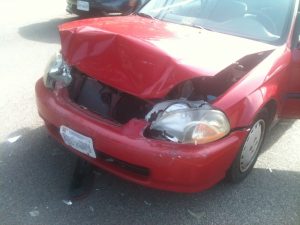Several years ago when my son was just starting to drive, I was unfortunate enough to have an incidental interaction with the law. In this case, it was the Richmond City Police which I now recall the police practices. I was riding in the passenger seat as my sixteen-year-old son, equipped with a learner’s permit, was driving my old Honda Civic. Typically when he drives, I have my radar on high alert to watch for potential hazards for a new driver who may act his age. However, I’d just received a call so my attention was focused on the phone call as we drove along Forest Hill Avenue during the 5 p.m. traffic.
All of a sudden, the cars ahead of us came to an abrupt stop, and though he braked hard, he couldn’t stop the car before slamming in to the car ahead of us. It ended up being a three-car crash. Fortunately, no one was hurt.
 Within minutes, the Richmond Police was there. After handing over the license, registration, and insurance card and dispensing with the routine questions, the officer said the tow trucks were on the way.
Within minutes, the Richmond Police was there. After handing over the license, registration, and insurance card and dispensing with the routine questions, the officer said the tow trucks were on the way.
Hold it. I have triple-A, which would tow my car for free. I told the officer I can get my own tow truck. He said he already put in the call. I asked if he could call it off and allow me to call triple-A. He said no. I paused. Frustrated, I turned and went back to my son for fear I might say something I might regret. It really made me mad that I was going to have to pay for an unnecessary tow. So, I went back to the officer. I asked again. I thought I made the case that I could have my own tow truck there within fifteen minutes and he was burdening me with an unnecessary cost. His answer was again ‘no’. What a prick, I thought. I turned around and went back to my son and my wife, who had just arrived.
After a few minutes, I noticed that Officer Prick drove away and there was another officer who had taken charge. So, I went to him. I said that I didn’t understand why I had to use their tow truck when I had triple-A and they could be here in fifteen minutes. He replied that I could use my own tow truck and he’ll simply cancel the call which Officer Prick had already made. It was that simple; Officer Prick just had to get out of the way and let Office Commonsense do his job.
So that was my brush with the law. But before getting to the point of my story, I need to make clear that I’m the guy who defends the police in conversations among friends and family. I understand they’ve got a very difficult job and have to constantly deal with difficult people in bad situations. Also, I think they’re underpaid for what their job entails. (According to the Richmond Gov Human Resources website, police officers make between $42,840 and $79,563.)
Police Practices and the Impact
My point is that police officers have a burden and responsibility to the those they come in contact with. It’s imperative to deal with the public fairly and use their discretion wisely. Because of their job, the decisions they make can have such a negative impact on peoples’ lives.
My case was minor; it wouldn’t have been the end of the world had Officer Prick succeeded in making me pay the unnecessary tow (just because he was being a prick). I would have begrudgingly paid the $50-$100 and moved on, but with a slightly bad taste in my mouth for the Richmond Police. And therein is the point. When police officers deal unfairly with people, they really hurt the relationship between the them and the public. Just one Officer Prick sets such a negative perception of the hundreds of Officer Commonsenses.
As a licensed bondsman, I’ve seen many instances where Officer Prick used his or her discretion for who-knows-what-reason to cause people to go through undue expense and hardship.
It seems that there’s always going to be a prick in every work environment, be it in an office or construction site. For many occupations, when dealing with the office prick, the problems and negative police practices impact from the prick stay within the bounds of the work environment. Not so with the other police officer. Interaction with a police officer can throw a persons life in to a tailspin. If the person commits a crime, then that’s the consequences. But if not and Officer Prick strikes, unjust hardship follows.
So my plea to police officers – don’t be pricks.
